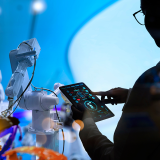
Przewidywanie skutków zmian i zarządzanie nimi
Przewidywanie skutków zmian i zarządzanie nimi jest jednym z sześciu głównych działań w ramach programu prac Eurofoundu na lata 2021–2024. Eurofound przedstawi dowody potwierdzające zmiany strukturalne wpływające na gospodarkę UE i unijne rynki pracy, wynikające w głównej mierze z cyfryzacji oraz przechodzenia na gospodarkę bezemisyjną , lecz także z kryzysu związanego z COVID-19. Celem badań jest wsparcie decydentów w przewidywaniu tych zmian oraz w przygotowywaniu europejskich rynków pracy oraz miejsc pracy na te zmiany.
Począwszy od 2021 r. Eurofound będzie dostarczać informacje na temat wpływu tych megatrendów na warunki życia i pracy w UE. W obszarze cyfryzacji badania będą koncentrować się na odnośnym wpływie na warunki zatrudnienia i pracy, a także na rynek pracy. Badane dziedziny będą obejmować dialog społeczny oraz jego rolę w kształtowaniu zmiany strukturalnej, ramy regulacyjne, ochronę socjalną i sztuczną inteligencję (SI). Bazując na wcześniejszych badaniach poświęconych pracy na platformie, okres 2021–2024 będzie okazją, aby skupić się na opracowaniu i przeprowadzeniu oceny skuteczności inicjatyw strategicznych w zakresie radzenia sobie z wyzwaniami zidentyfikowanymi w odniesieniu do pracy na platformie.
Eurofound będzie również dążyć do wsparcia przejścia UE na gospodarkę bezemisyjną, z uwzględnieniem gospodarki o obiegu zamkniętym i wdrożenia narzędzia służącego odbudowie gospodarki UE NextGenerationEU, poprzez badanie skutków społeczno-gospodarczych. Skutki te obejmują zmiany w zatrudnieniu oraz transformację miejsc i warunków pracy, jak również skutki dystrybucyjne polityk klimatycznych. Podstawą części tych badań będą wyniki projektu pilotażowego dotyczącego przyszłości produkcji (FOME) realizowanego przez Eurofound.
Aby kontynuować te prace w latach 2021–2024, Eurofound będzie współpracować z różnymi organizacjami międzynarodowymi i agencjami UE, na przykład z Europejską Agencją Środowiska (EEA) w odniesieniu do skutków społecznych polityk klimatycznych. Ponadto obecna współpraca z innymi podmiotami badawczymi w obszarach cyfryzacji – takimi jak Wspólne Centrum Badawcze (JRC), Agencja Praw Podstawowych Unii Europejskiej (FRA) oraz Europejska Agencja Bezpieczeństwa i Zdrowia w Pracy (EU-OSHA) – zostanie skonsolidowana. Przewiduje się również kontynuowanie partnerstwa z Międzynarodową Organizacją Pracy (ILO) w obszarze zmieniającego się świata pracy.
- Infografika: Przewidywanie skutków zmian w UE i zarządzanie nimi
„Gospodarka UE i unijne rynki pracy charakteryzują się wpływem megatrendów, zwłaszcza cyfryzacji oraz przejścia na gospodarkę bezemisyjną. Należy dokładnie zbadać, w jaki sposób te zmiany zachodzą, co się zmienia i jak będzie to wpływać nie tylko na przedsiębiorstwa, lecz także na siłę roboczą i społeczeństwo.”
Irene Mandl, kierowniczka Działu Zatrudnienia



































